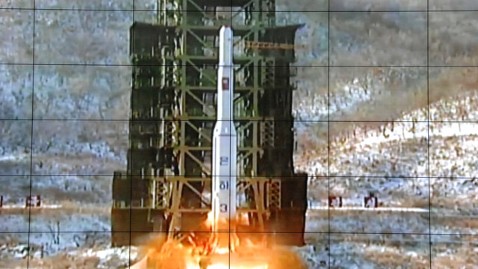State Department: Missile Launch Will 'Further Isolate' North Korea

AP Photo
State Department spokesperson Victoria Nuland today called North Korea's deployment of an intercontinental ballistic missile "highly provocative" and said the country would face international consequences.
The country's foreign ministry asked that the launch not be "overblown" in the international sphere, but U.S. officials are not holding back in expressing their displeasure. North Korea violated two U.N. Security Council resolutions with its launch of a missile Tuesday night, Nuland said.
"It is highly regrettable that North Korea chose to take this course in flagrant violation of its international obligations," Nuland said at the press briefing. "It is only going to serve to further isolate the North Korean regime; it's not going to do anything to help the poor, suffering North Korean people. It's only going to further impoverish them."
North Korean leader Kim Jong Un has a choice to make, Nuland said.
ANALYSIS: North Korean Missile Hits Its Target of Alarming the World
"He can plot a way forward that ends the isolation, that brings relief and a different way of life and progress to his people, or he can further isolate them with steps like this. He can spend his time and his money shooting off missiles, or he can feed his people, but he can't have both."
A U.S. official told ABC News the operation launched a rudimentary satellite in a polar orbit, saying the administration does not anticipate it will fall out of the sky anytime soon.
Four U.S. Navy ships were never close to shooting down the missile as it was assessed very quickly that it would not pose a threat to U.S., the official said.
The missile has three stages: The first stage splashed into Yellow Sea, the second stage into the Philippine Sea north of Luzon Island. The third stage is in orbit. Its job was to take the payload into space so it too remains in space and has its own orbit.
PHOTOS: An Inside Look At North Korea
The official said that by achieving a third stage capability North Korea has proven they can go exo-atmospheric. That means they now have a technology that could be weaponized into an ICBM, which has been the concern behind the North Korean space program all along.
Stephen Ganyard, ABC News consultant and former deputy assistant secretary of state, said this launch did not come as a surprise.
"The U.S. and our allies have known for a long time that this ability was coming, that the North Koreans were determined to demonstrate," Ganyard told ABC News senior foreign affairs correspondent Martha Raddatz. "This is the first time in four launches that has seen a successful launch with one more step along the way to creating an inter-continental ballistic nuclear capability. From that perspective it is very concerning."
A U.S. official said achieving this capability means their missile technology could reach both Alaska and the West Coast of the United States.
Kurt Campbell, US Assistant Secretary of State for East Asian and Pacific Affairs, said earlier today that the U.S. would continue to work with partners in the UN Security Council to determine the next step in addressing what he called "a provocative act."
"We will be working with our allies: South Korea, Japan, others, to do a full assessment of what's transpired," Campbell said at a press conference Wednesday. "Our primary point at this juncture is that this step is provocative, it is in strict violation of UN Security Council resolutions, and we along with the Philippines and other countries in the Asia Pacific region condemn it."
U.S. Ambassador to the UN Susan Rice said the statement issued by the Security Council today "is one of the swiftest and strongest, if not the swiftest and strongest, that this Council has issued" during her tenure there.
Speaking about the Six Party partner talks - negotiations centered around North Korea's nuclear weapons program - during a question-and-answer session with reporters, Rice said, "Our view is that for there to be a credible resumption of the Six Party process the North Koreans have to demonstrate clearly and without equivocation their commitment to de-nuclearization."
"Clearly today's actions more than call into question-or, yesterday's actions-more than call into question that commitment."